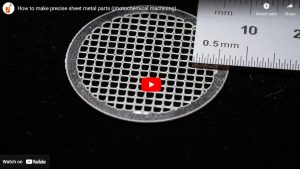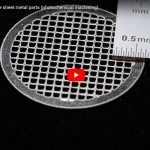Chemical machining, also known as chemical milling or chem-milling, is a subtractive manufacturing process that involves the controlled removal of material from the surface of a workpiece using chemical reactions. This process is typically used for materials that are difficult to machine using traditional mechanical methods due to their hardness, brittleness, or complex shapes.
Here’s an overview of how chemical machining works:
- Masking: The process begins with masking the areas of the workpiece that are not intended to be chemically etched. Masking is typically done by applying a protective mask, often made of wax, resin, or a photoresist material, to the areas to be preserved. The mask prevents the chemical etchant from acting on these regions.
- Chemical Etching: The masked workpiece is then immersed in a chemical etchant solution. The etchant is selected based on the material being processed. The etchant chemically reacts with and removes material from the exposed surfaces of the workpiece.
- Controlled Material Removal: The rate of material removal is carefully controlled by various factors, including the type and concentration of the etchant, temperature, and time. This control ensures precise and uniform material removal.
- Rinsing and Cleaning: After the desired amount of material has been removed, the workpiece is removed from the etchant solution, rinsed thoroughly, and cleaned to remove any remaining chemicals and residues.
Chemical machining is known for its ability to produce highly accurate and intricate shapes with minimal distortion or stress on the workpiece. It is often used in industries such as aerospace, electronics, and automotive for producing complex components like engine parts, aerospace structures, and electronic circuit boards.
However, chemical machining also has some limitations, including environmental concerns related to the disposal of chemical waste and the need for careful handling of hazardous chemicals. Additionally, it is typically a batch process, which may not be as suitable for high-volume production as some other manufacturing methods.


